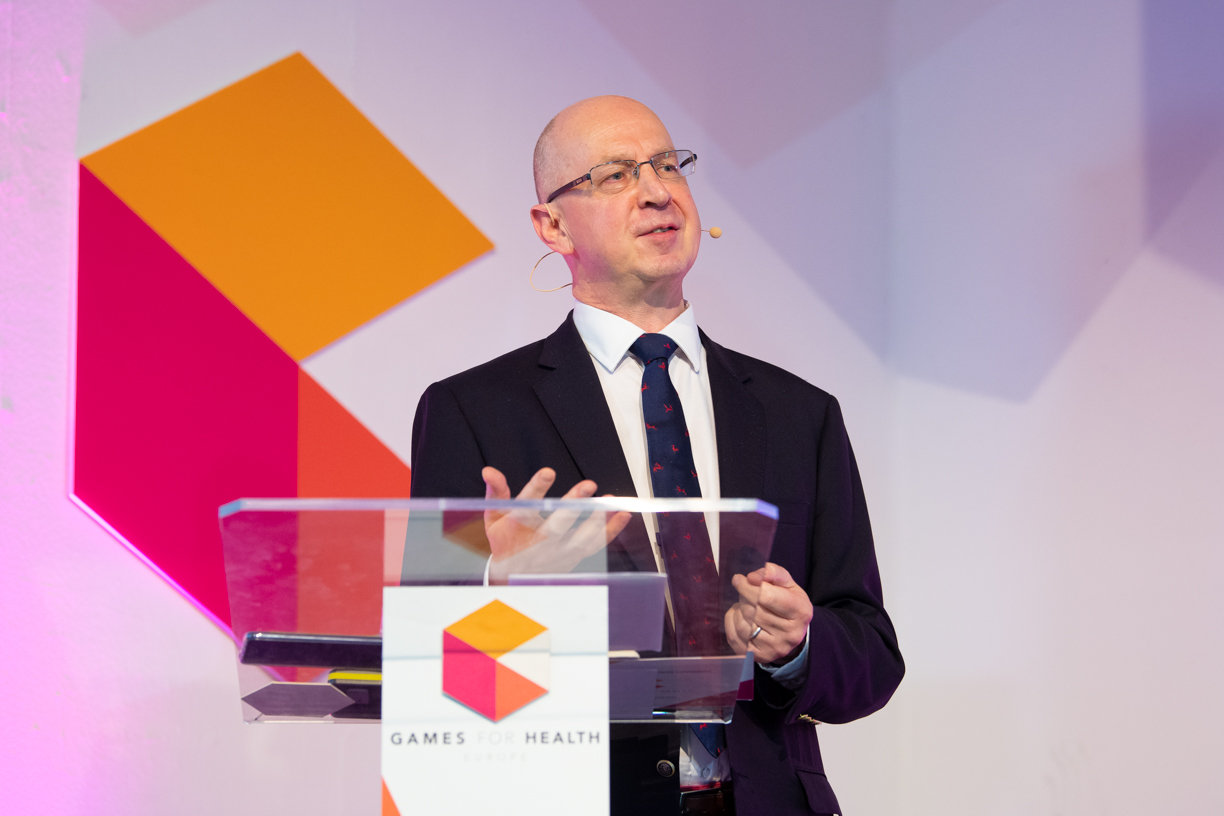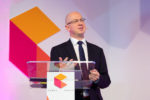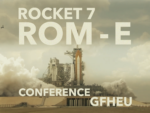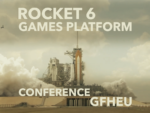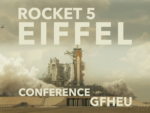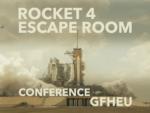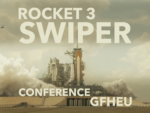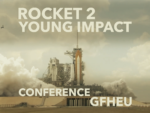Games for Health EU 2019: The Host’s Tale
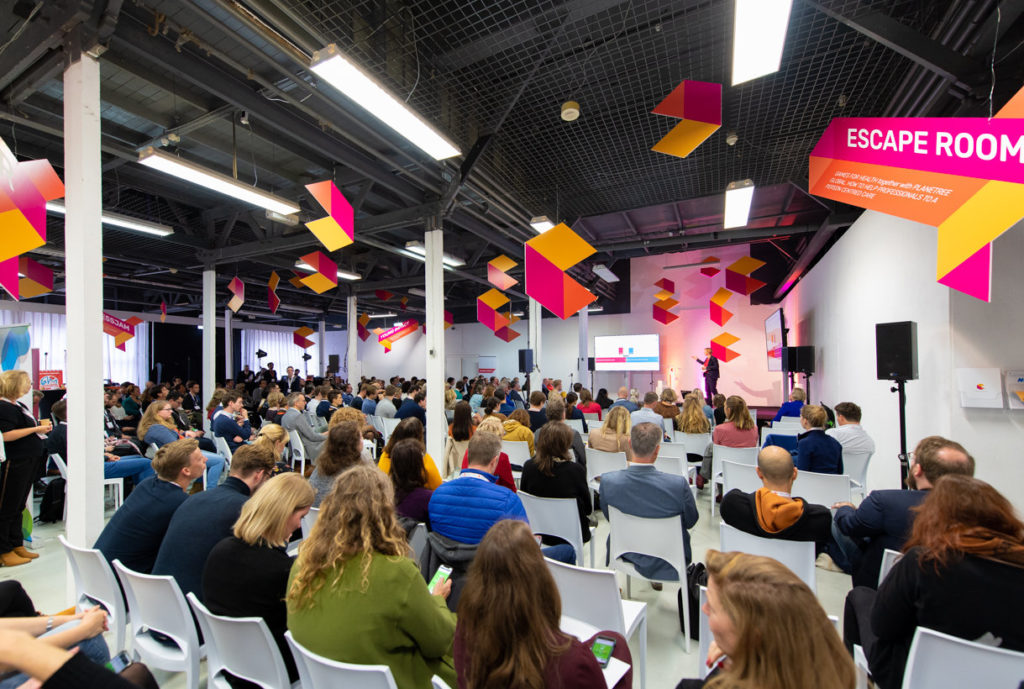
So, the dust has settled on the 9th Games for Health. The microphones have been carefully packed away, the lights have been dimmed and the exhibitors have taken down their stands in preparation for the next event. I am as far as Schiphol, via Hoofddorp, with time to reflect on the proceedings of the past two days.
I find it helpful to begin by capturing the essence of an experience in three words. So, what would I say of my Games for Health experience? Simply put, I feel energized, purposeful and optimistic. Now, the role of host does tend to get the adrenaline flowing – lots of multitasking to be done, but I am writing this the morning after the party, so hopefully my hormone levels are back to normal. What accounts for my energy, purpose and optimism? Here goes:
Energized – I go to LOTS of conferences, and they are all scholarly affairs and a great opportunity to catch up with friends, clients and the latest news on Alzheimer’s disease, Parkinson’s disease, schizophrenia and other neurological and psychiatric diseases. In spite of our best efforts these disorders still represent areas of significant unmet need and continue to challenge our best efforts to cure and relieve the symptoms of these terrible diseases. To take Alzheimer’s disease as a specific example, our repeated failure to find new treatments has left many in the field slightly brow beaten. We remain optimistic, but a cure for Alzheimer’s currently feels as far away as it did when I first started working on this disorder in the now distant 20th century. The GFHEU community wrestles with the same challenges but focuses on issues such as prevention through changing behaviour and helping to find strategies to aid people living with challenging disorders. There were many examples of both these approaches on show in the more 90 workshops, plenary lectures and breakout sessions across the two days of this year’s event. However, recent GFHEU meetings have featured a third approach in the form of citizen science projects designed help researchers crack some of the difficult and often very timing consuming basic research challenges.
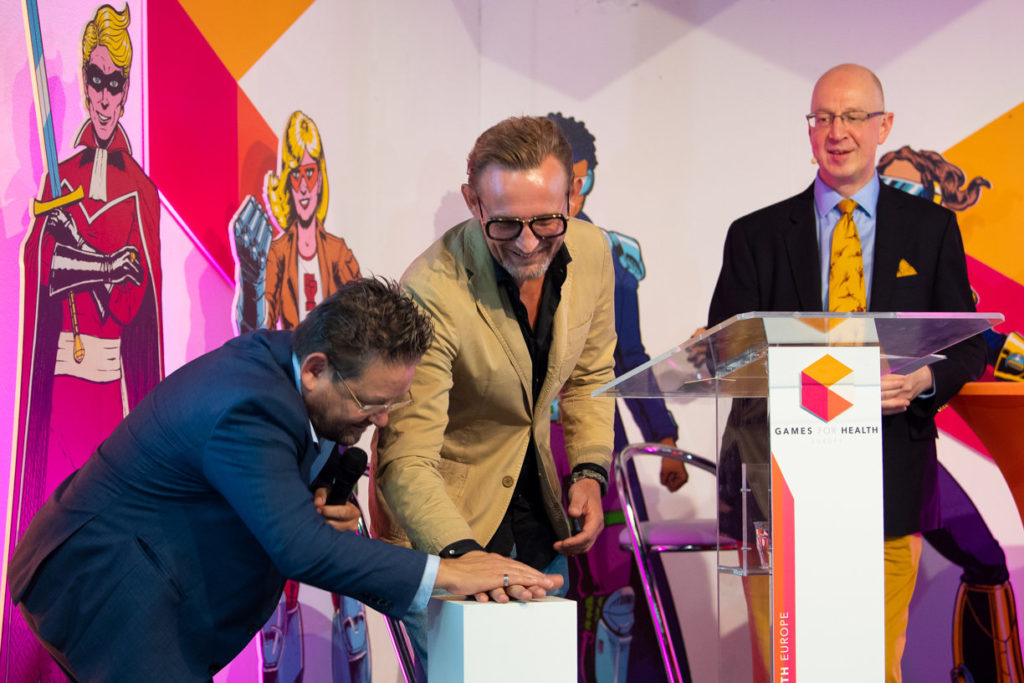
We have previously hosted innovators and entrepreneurs focused on mapping brain cells, and last year showcased the Stallcatchers initiative. This year’s event witnessed the inauguration of a new initiative focused on lymphoma. As is often the case, the initiative for this project had its genesis in the lived experience of those who have been directly affected by this disorder. We were privileged to hear from Bernhard van Oranje on this topic. First-hand accounts of personal missions born from lived experience have long been a feature of GFHEU. It is not for me to tell the tales of these brave and resilient individuals. They do a far better job and you can read their stories elsewhere.
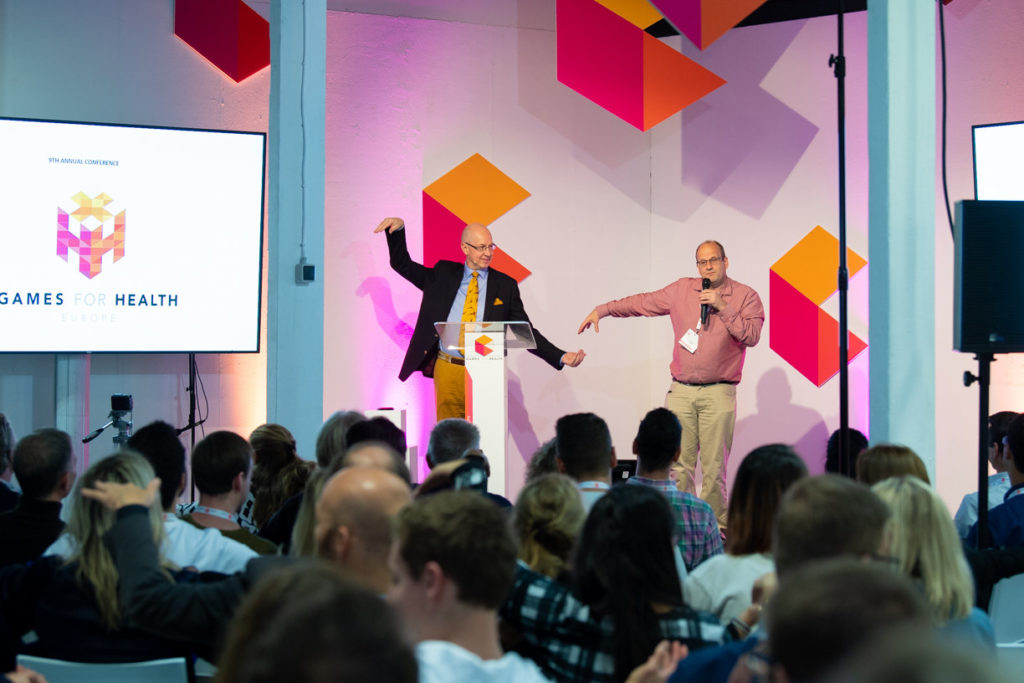
Purposeful – being in the company of individuals with a passion to fix things and witnessing their resilience in the face of adversity is inspiring. A comment I hear from delegates after every GFHEU is the sense of purpose they feel after attending sessions, workshops and keynote sessions. The message is itself a powerful motivator, but often so too is the delivery. We are always blessed in having inspirational speakers. Some have impressed us so much at past conferences that we have them back and it is always a pleasure to listen to Ellis Bartholomeus, Ilias Iakovides and Erik Gerritsen. This year we welcomed Anthony DeBenedet,Lisette van Gemert, Bernhard van Oranje, Marcel Olde Rikkert, Wico Mulder and Zayna Khayat to the GFHEU keynote alumni. Zayna has already been invited to join us again for #GFHEU20 to celebrate the launch of her forthcoming book.
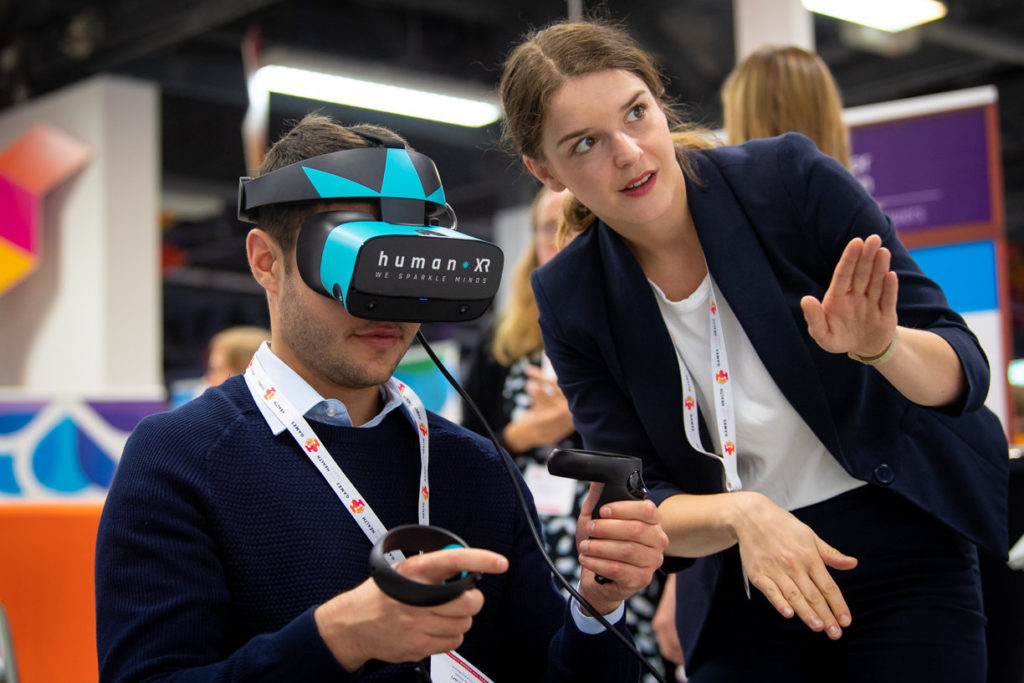
Optimistic – This is the easy one. #GFHEU is a living example of optimism. At all eight of the conferences I have attended there has been an air of optimism, most obvious in presentations of new ideas, but often also in the implementation stage accounts. Even in the context of climate concern, displaced peoples and other challenges of modern life, the response was universally a simple but effective ‘What can we do to help?’. Zayna and Ilias in particular emphasised the importance of addressing these issues, offering practical advice and possible funding respectively. Panel presenters and exhibitors offered their own positive solutions. However, the greatest evidence of optimism was to be seen in the younger delegates. Throughout the conference we were lucky to have a group of students engaged in making a documentary of Games for Health and their impression of the event. Happily, they were also willing to share, very eloquently, their own concerns for the future. The positive impact of younger conference participants was also to be felt in the inspirational ‘The art of making prevention work in youth health (from urgence to essence)’ session instigated by Wico Mulder. However, this was no solo effort and Wico was content to leave discussion of the possible solutions to Yusuf Khalid and his friends.
So, we are all done until 12th & 13th October 2020, when we will assemble for the 10th anniversary meeting. Hopefully I will return home on the 14th October as energized, purposeful and optimistic as I did last week. Hopefully more rockets too….
John Harrison
Friday 11th October 2019.
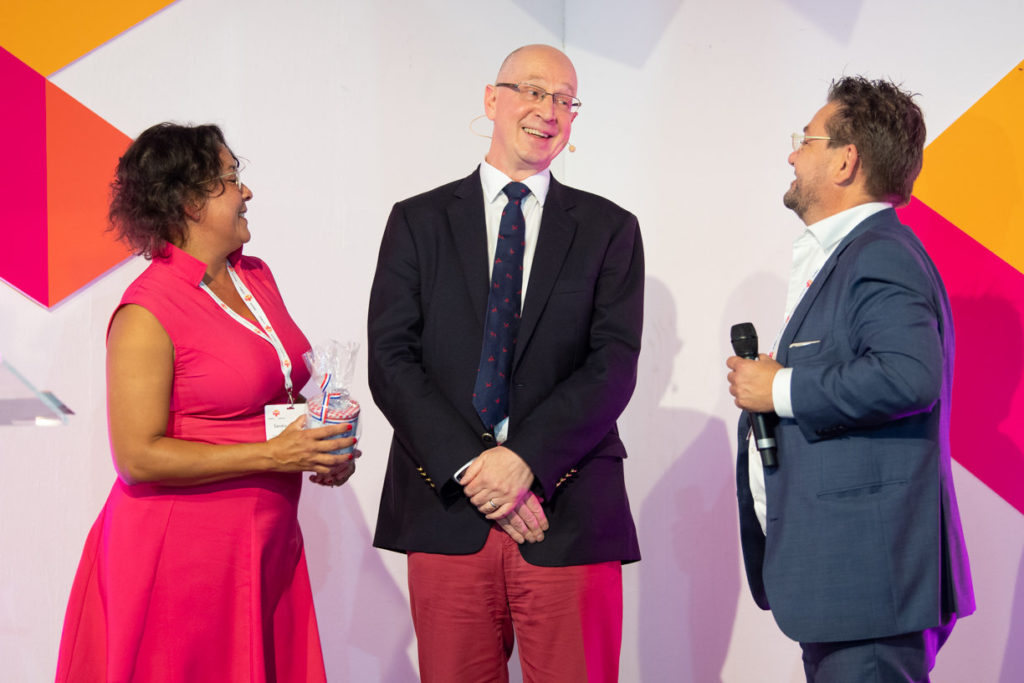
Games for Health EU 2019: The Host’s Tale

So, the dust has settled on the 9th Games for Health. The microphones have been carefully packed away, the lights have been dimmed and the exhibitors have taken down their stands in preparation for the next event. I am as far as Schiphol, via Hoofddorp, with time to reflect on the proceedings of the past two days.
I find it helpful to begin by capturing the essence of an experience in three words. So, what would I say of my Games for Health experience? Simply put, I feel energized, purposeful and optimistic. Now, the role of host does tend to get the adrenaline flowing – lots of multitasking to be done, but I am writing this the morning after the party, so hopefully my hormone levels are back to normal. What accounts for my energy, purpose and optimism? Here goes:
Energized – I go to LOTS of conferences, and they are all scholarly affairs and a great opportunity to catch up with friends, clients and the latest news on Alzheimer’s disease, Parkinson’s disease, schizophrenia and other neurological and psychiatric diseases. In spite of our best efforts these disorders still represent areas of significant unmet need and continue to challenge our best efforts to cure and relieve the symptoms of these terrible diseases. To take Alzheimer’s disease as a specific example, our repeated failure to find new treatments has left many in the field slightly brow beaten. We remain optimistic, but a cure for Alzheimer’s currently feels as far away as it did when I first started working on this disorder in the now distant 20th century. The GFHEU community wrestles with the same challenges but focuses on issues such as prevention through changing behaviour and helping to find strategies to aid people living with challenging disorders. There were many examples of both these approaches on show in the more 90 workshops, plenary lectures and breakout sessions across the two days of this year’s event. However, recent GFHEU meetings have featured a third approach in the form of citizen science projects designed help researchers crack some of the difficult and often very timing consuming basic research challenges.

We have previously hosted innovators and entrepreneurs focused on mapping brain cells, and last year showcased the Stallcatchers initiative. This year’s event witnessed the inauguration of a new initiative focused on lymphoma. As is often the case, the initiative for this project had its genesis in the lived experience of those who have been directly affected by this disorder. We were privileged to hear from Bernhard van Oranje on this topic. First-hand accounts of personal missions born from lived experience have long been a feature of GFHEU. It is not for me to tell the tales of these brave and resilient individuals. They do a far better job and you can read their stories elsewhere.

Purposeful – being in the company of individuals with a passion to fix things and witnessing their resilience in the face of adversity is inspiring. A comment I hear from delegates after every GFHEU is the sense of purpose they feel after attending sessions, workshops and keynote sessions. The message is itself a powerful motivator, but often so too is the delivery. We are always blessed in having inspirational speakers. Some have impressed us so much at past conferences that we have them back and it is always a pleasure to listen to Ellis Bartholomeus, Ilias Iakovides and Erik Gerritsen. This year we welcomed Anthony DeBenedet,Lisette van Gemert, Bernhard van Oranje, Marcel Olde Rikkert, Wico Mulder and Zayna Khayat to the GFHEU keynote alumni. Zayna has already been invited to join us again for #GFHEU20 to celebrate the launch of her forthcoming book.

Optimistic – This is the easy one. #GFHEU is a living example of optimism. At all eight of the conferences I have attended there has been an air of optimism, most obvious in presentations of new ideas, but often also in the implementation stage accounts. Even in the context of climate concern, displaced peoples and other challenges of modern life, the response was universally a simple but effective ‘What can we do to help?’. Zayna and Ilias in particular emphasised the importance of addressing these issues, offering practical advice and possible funding respectively. Panel presenters and exhibitors offered their own positive solutions. However, the greatest evidence of optimism was to be seen in the younger delegates. Throughout the conference we were lucky to have a group of students engaged in making a documentary of Games for Health and their impression of the event. Happily, they were also willing to share, very eloquently, their own concerns for the future. The positive impact of younger conference participants was also to be felt in the inspirational ‘The art of making prevention work in youth health (from urgence to essence)’ session instigated by Wico Mulder. However, this was no solo effort and Wico was content to leave discussion of the possible solutions to Yusuf Khalid and his friends.
So, we are all done until 12th & 13th October 2020, when we will assemble for the 10th anniversary meeting. Hopefully I will return home on the 14th October as energized, purposeful and optimistic as I did last week. Hopefully more rockets too….
John Harrison
Friday 11th October 2019.

